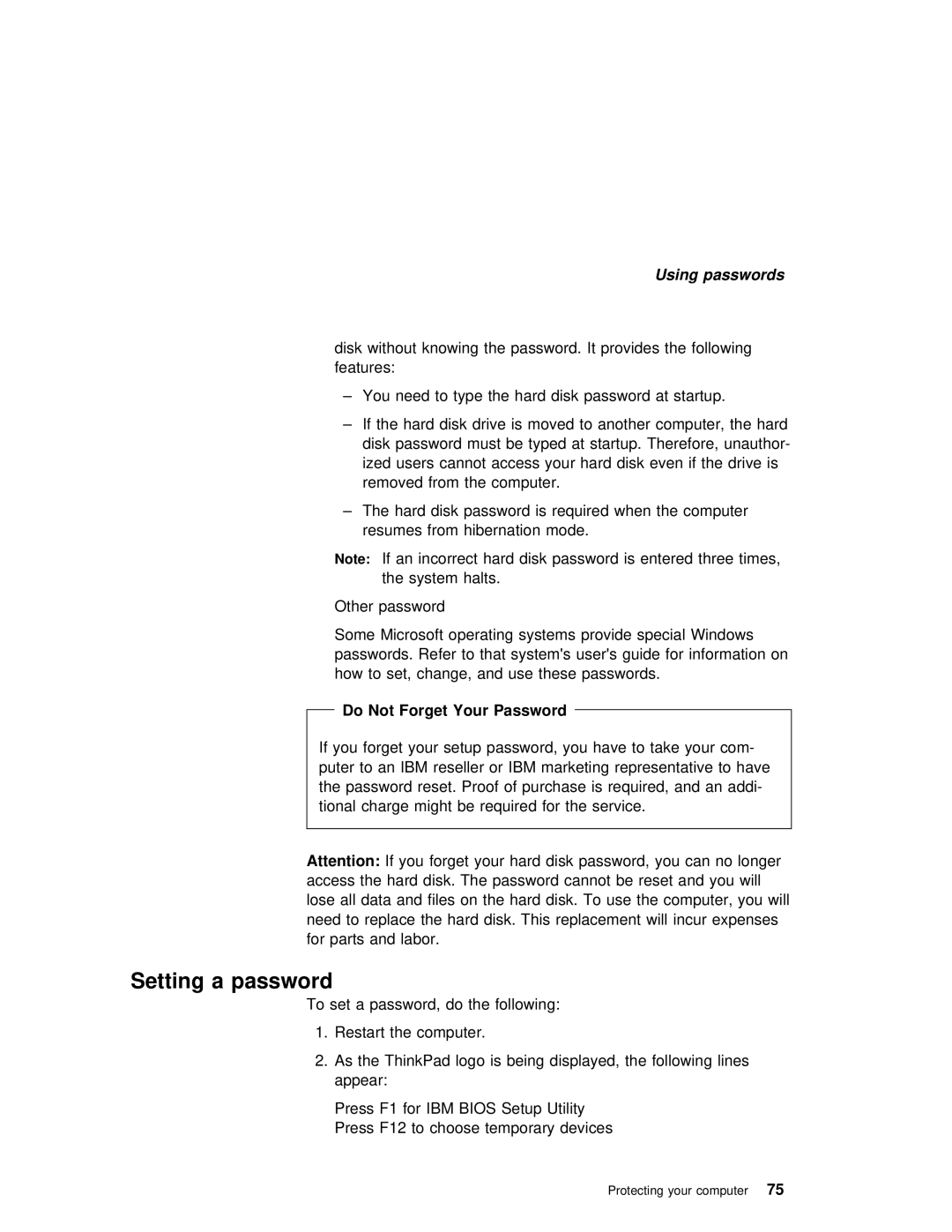Page
With local law
First Edition March
Iii
ThinkPad ThinkPad
Technology
Functional highlights
Disk drive
Audio with 3D
Functional highlights
About this book
Specifications
About this book
Getting familiar with your computer, acquaints you
Safety information
Safety information
Electrical safety notice
Landfills
Trash That is
Or regulations
States Call
Incor Rectly
Battery
File
Type
Procedures
Or service
Drive User
Parts Are inside
Contents
Xii
Xiii
Appendix B. Product warranties and notices
Xiv
This chapter provides basic information about your computer
Getting familiar with your computer
Hole
Identifying the hardware features
Front view of the computer
Launch buttons
Identifying the hardware features
Rear view of the computer
Theline-in jack
Indicator
Twouniversal serial bus USB ports allow you to
ThePC Card eject button
Bottom view of the computer
Thebattery pack
System status indicators
System status indicators
Not all Application Programs support this func
Color
Distinctive functions of your computer
TrackPoint
Your Computer
Buttons
Distinctive functions of your computer
Cap
Home End
Fn key
Backspace
PgUp , PgDn
Fn+F9
Icon Key Combination
Fn+F10
Fn+F11
Icon Key Combination Meaning
Easy Launch Buttons
Fn+F2
Fn+F4
Numeric keypad
CD-ROM drive
Using the CD-ROM drive
Computer
ThinkPad utility programs
Handling CDs
Bios Utility
System InformationSelecting theSystem Information item
Bios Utility
Diskette
System Bios Version
Version
Type
Startup ConfigurationSelecting theStartup Configuration
Basic System SettingsSelecting theBasic System Settings
Display
Boot Drive
Key Lock
1st 2nd and 3rd
Choosing
Boot Device
Onboard Devices ConfigurationSelecting theOnboard
Onboard Devices Configuration
Enter Selecting Yes will erase all your changes
System SecuritySelecting
Post
Post
Boot Sequence
Getting familiar with your computer29
Distinctive functions of your computer
Sleep Manager
Parallel Port
Sleep Manager
TheEasy Launch buttons
Easy Launch Buttons Customization Utility
Buttons Utility
Conthe Trols
On Screen
Easy Launch buttons optionsWhen you click the Options
An Application
Customizing the Easy Launch buttonTo customize
If you Launch mark an Application
Your
Online Users Guide
1200/1300 then
Guide
Reinstalling software
Reinstalling software
Recovery CD
Replacing the battery pack
Replacing the battery pack
ThinkPad dos
Handling your ThinkPad computer
ThinkPad donts
Handling your ThinkPad computer
Public-switched telephone network Pstn Use of a phone
Life
Cleaning your computer
Carrying your computer
For more information
ThinkPad i Series 1200/1300 Users Reference
Extending the features of your computer
TheTrackPoint
Customizing the TrackPoint
Changing TrackPoint sensitivity
Customizing the TrackPoint
Enabling Press-to-Select
You can click by
Customizing
Enabling the scrolling feature
Choosing the scrolling method
Panel
Changing
Assignments
Extending the features of your51computer
Dimm
Increasing memory
Increasing memory
How to Calculate Total Memory Size
Boot
Extending the features of your55 computer
Upgrading the hard disk drive
Upgrading the hard disk drive
Hard Disk drive
Keypad
Or keyboard
Attaching an external mouse, keypad or keyboard
Keypad
Mouse, keypad or keyboard
Keyboard
Attaching an external keyboard and mouse
Mouse
Disabling the TrackPoint
Using IBM
Or keyboard
Saver
Click theDisplay Device
Attaching an external monitor
Attaching an external monitor
Display output location
ClickStart , Settings
Settings
Expansion
DOS Screen Image on the LCD
Only External monitor OrBoth
Display modes
Panel Only
Depth
Control
Function
TheSettings tab
Considerations when using dual display
Disabling dual Display
An external monitor
Attaching an external monitor
Attaching a printer
Attaching a printer
Inserting a PC Card
Inserting a PC Card
Users Guide
Removing the PC Card
For more information on using a PC Card,OnlineseeUsersthe
Protecting your computer
Using passwords
Do Not Forget Your Password
Setting a password
Using passwords
Password
Setup
Passwords
Entering a password
Removing and changing a password
Protecting your computer79
Using locks
Using locks
Solving computer problems
Questions
Frequently asked questions
Frequently asked questions
ClickControl Panel
Switching or bothDisplay with
ClickAdvanced
ThenClose
Panel
How do I maximize battery life?
For This
System?
Turn Off Using
How Use the Recovery CD
ThinkPad
How
Hints, tips and considerations
Hints, tips and considerations
Troubleshooting guide
Troubleshooting guide
Chart
Troubleshooting charts
Troubleshooting charts
Action
Error
Problem
OrFn+Delete
Messages
Problem Action
Input problems
Fn+Insert AndFn+Delete
Output is not displayed. This
Or hibernation problems
Does
Value
Enough
LCD problems
Battery problems
Indicator problems
CD-ROM Problems
Settingsto
Audio Problems
Bus
Press Fn+Backspace
Tone
Modem problems
Dialing
Properties
Address System resource conSee Resolving System Resource
Printer problems
Then clickControl Panel
Monitor
ClickExternal monitor
Solving computer problems105
Option
Other
Software problems
Other problems
Recovering
Recovering lost or damaged software
Lost
Windows
Using the Recovery CD
Board
ThinkPad i Series 1200/1300 Users Reference
About Your Warranty
Getting service
113
Preparations
Option list
Information on your computer
Identification numbers
Information on your computer
Problem recording sheet
Customer service and support
Customer service
Help by telephone
World
EasyServ
Enhanced PC support line
Purchasing additional services
Purchasing additional services
Warranty and repair services
Ordering support line services
Getting service121
Purchasing additional services
123
Appendix A. Features and specifications
Features
Features
Processor
Keyboard
External interface
MB, 3.5-inch, unformatted diskette
Internal CD-ROM drive
Specifications
Specifications
IBM power cords
IBM power cords
For
Number
Used in these countries or regions
Power
Part
Period
Appendix B. Product warranties and notices
For Machines
129
Extent
Items Not Covered by Warranty
Warranty
IBM-SERV 426-7378 . In Canada, call IBM at
Warranty Service
Liability
Status
Appendix B. Product warranties and 133notices
Year 2000 readiness Instructions
Federal Communications Commission FCC statement
Trademarks
Electronic emission notices
Canadian Department of Communications compliance statement
Rules
Telecommunication notice
European Community Directive conformance statement
Fax branding
Australia
Industry Canada requirements
Ringer
Avis
Modem
Integrated
Avertissement
Modem
Users
New
Users IBM ThinkPad
New Zealand Reverse Dialling standard
That Fault
145
Index
FAQ
Setting Software Problems
Volume turning off

